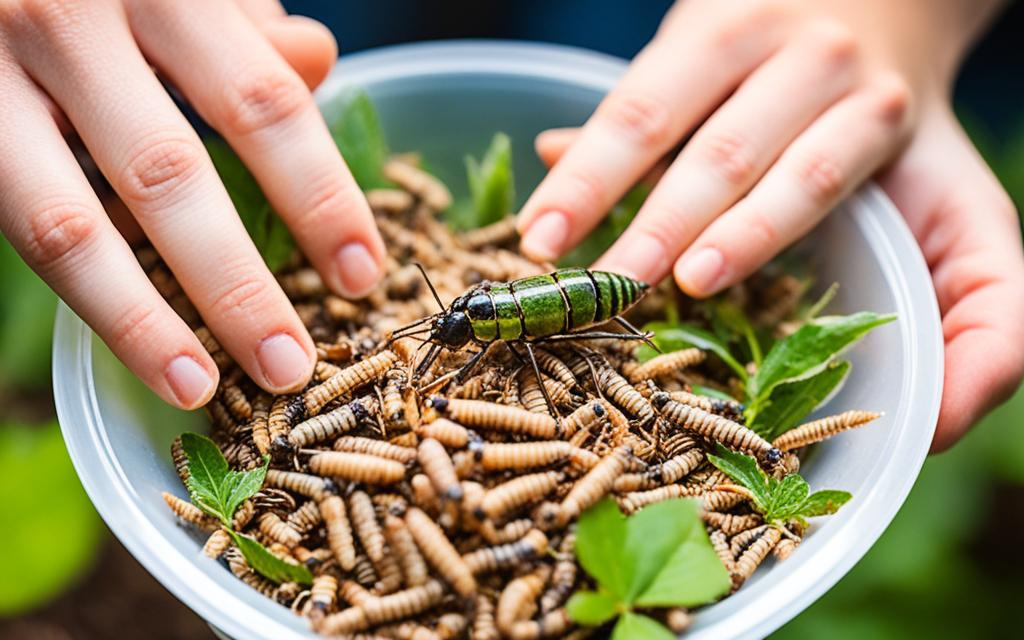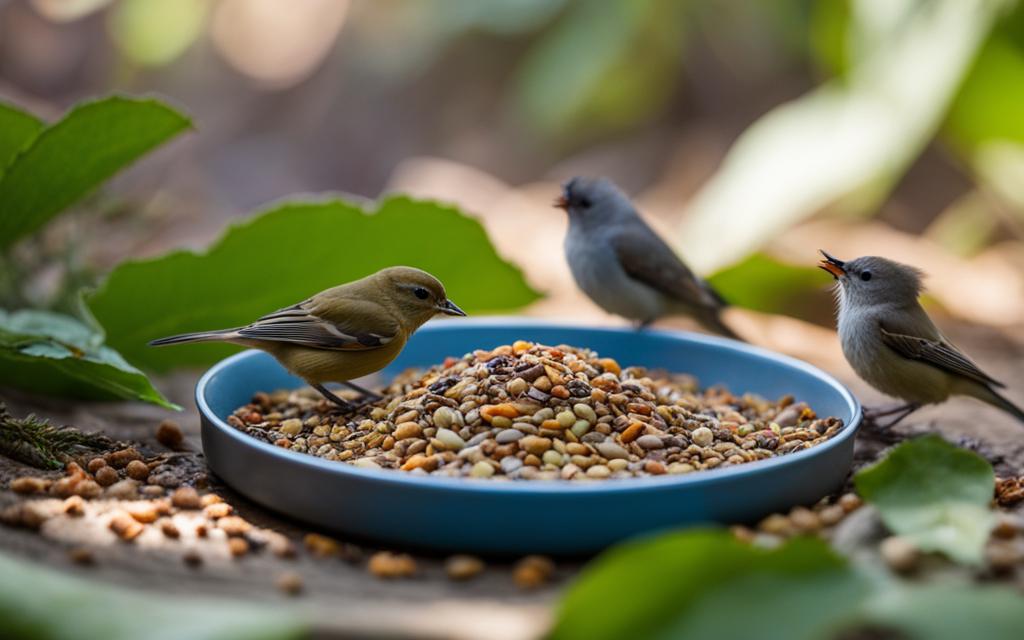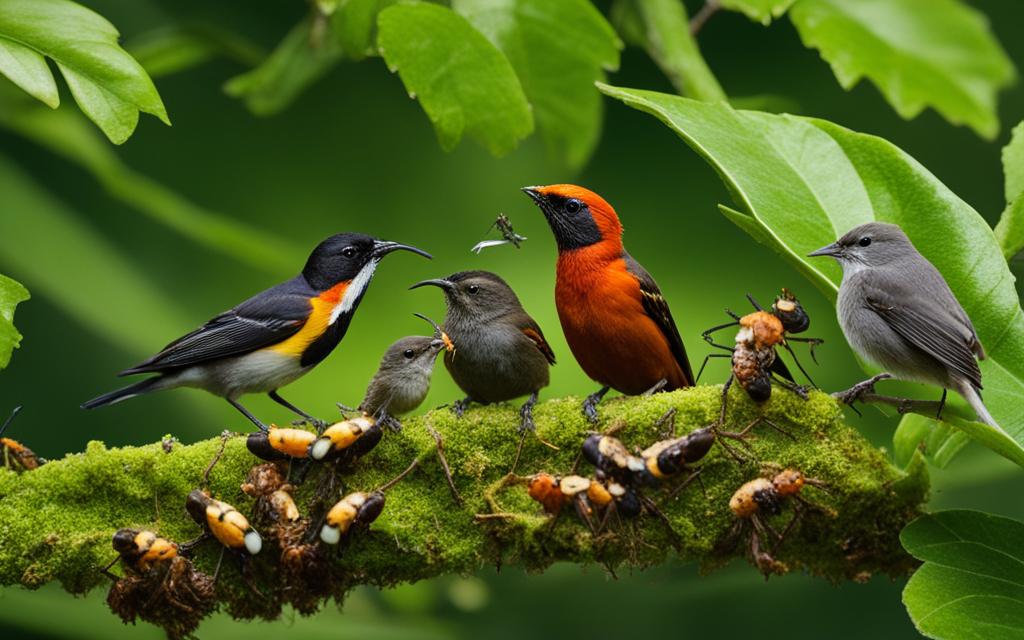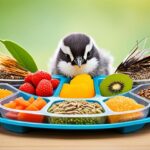Welcome to our comprehensive guide on what to feed baby birds. As a responsible bird caretaker, it’s essential to provide the right diet to ensure the healthy growth and development of our feathered friends. In this section, we will explore the best diet options for nurturing baby birds with care.
Key Takeaways:
- Feeding baby birds the appropriate food is crucial for their overall health and well-being.
- Understanding the nutritional needs of baby birds is essential before selecting their diet.
- Natural and commercial diets are both viable options for baby birds, each with its own benefits.
- If you prefer a more hands-on approach, you can create homemade baby bird food using proper recipes and guidelines.
- Establishing a feeding schedule and portion control ensures the balanced nutrition of baby birds.
Understanding Baby Bird Nutrition
Before we delve into specific food options, it’s crucial to understand the nutritional needs of baby birds. Providing the right diet is essential for their healthy development and overall well-being. Let’s explore the key nutrients and food groups that are vital for feeding baby birds and supporting their growth.
Key Nutrients for Feeding Baby Birds
Feeding baby birds requires a balanced diet that provides the necessary nutrients for their rapid growth. Here are some key nutrients to consider:
- Protein: Protein plays a critical role in muscle development and tissue repair. It is especially important for growing birds. Sources of high-quality protein include insects, mealworms, and lean meats.
- Fat: Fat provides energy and supports healthy feather development. In the wild, birds may get fats from insects, seeds, or nuts. Commercial bird formulas often include a suitable balance of fats.
- Carbohydrates: Carbohydrates provide energy and are essential for proper growth. Fruits, vegetables, and grains are good sources of carbohydrates for baby birds.
- Calcium: Calcium is crucial for bone and beak development in baby birds. It can be provided through cuttlebone, crushed eggshell, or calcium-enriched bird foods.
- Vitamins and Minerals: Baby birds require a range of vitamins and minerals for proper growth and immune function. These can be obtained through a varied diet that includes fruits, vegetables, and vitamin supplements.
Now that we understand the key nutrients, let’s explore the food groups that provide these essential components of a baby bird’s diet.
Food Groups for Feeding Baby Birds
The following food groups should be included in a baby bird’s diet to ensure a well-rounded and nutritious meal:
| Food Group | Examples |
|---|---|
| Insects and Bugs |
|
| Fruits and Vegetables |
|
| Seeds and Nuts |
|
| Bird-Specific Formulas |
|
By offering a diverse range of foods from these groups, you can ensure your baby birds receive a well-rounded and nutritionally complete diet.
“Feeding baby birds requires a balanced diet that provides the necessary nutrients for their rapid growth.”
Understanding the nutritional needs of baby birds is the first step towards providing them with a healthy diet. By incorporating the essential nutrients and food groups discussed above, you can ensure optimal growth and development for your feathered friends. In the next section, we will explore natural and commercial diets available for baby birds, helping you make informed choices for their nutritional well-being.
Natural and Commercial Diets for Baby Birds
When it comes to ensuring the healthy growth of baby birds, providing an appropriate diet is essential. In this section, we will explore the different types of diets available for baby birds and discuss the benefits of both natural and commercial food options. By understanding the options and making informed choices, you can provide the best diet for your feathered friends.
Natural Diets
Natural diets for baby birds consist of foods that they would consume in the wild. These diets aim to mimic the nutrition provided by their parents. Natural diets often include a combination of insects, worms, seeds, fruits, and vegetation. They are rich in essential nutrients and offer a diverse range of flavors and textures to stimulate their appetite and support healthy development.
Feeding baby birds natural diets has several advantages:
- Diet Diversity: Natural diets offer a variety of food options that replicate what baby birds would find in their natural habitat.
- Nutritional Balance: Natural diets provide a well-rounded mix of proteins, carbohydrates, fats, vitamins, and minerals required for proper growth.
- Variety of Textures: The different textures of insects, worms, and fruits help baby birds develop their beak strength and feeding skills.
Remember, if you are considering feeding baby birds a natural diet, ensure that you choose appropriate food items based on their species and developmental stage. Consulting with an avian veterinarian or an expert in avian care is always a good idea to ensure you are providing a balanced and safe diet.
Commercial Diets
Commercial diets specially formulated for baby birds are convenient and provide a reliable balance of essential nutrients. These diets are available in the form of powders, pellets, or liquids. They are nutritionally dense and designed to meet the specific needs of growing birds. Commercial diets offer several benefits:
- Nutritional Adequacy: Commercial diets are scientifically formulated to provide the necessary nutrients for healthy growth and development.
- Convenience: Commercial diets are readily available and save time in preparing meals for baby birds.
- Hygiene and Safety: Commercial diets undergo rigorous quality control measures to ensure they are safe and free from contaminants.
It is important to note that while commercial diets can be a convenient option, they should not replace the natural diets entirely. Baby birds may benefit from a combination of both natural and commercial diets to ensure a well-rounded and nutritionally balanced food intake.
Now that we have explored natural and commercial diets for baby birds, the next section focuses on hand-feeding techniques for orphaned baby birds.
| Diet Type | Advantages |
|---|---|
| Natural Diet |
|
| Commercial Diet |
|
Hand-Feeding Techniques for Orphaned Baby Birds
When it comes to caring for orphaned baby birds, hand-feeding can be a critical skill. This technique allows you to provide the necessary nourishment for these vulnerable hatchlings, ensuring their healthy growth and development.
Before attempting hand-feeding, it’s important to gather the essential supplies:
- A syringe or pipette
- A suitable feeding formula for baby birds
- A small feeding bowl or dish
- A soft cloth or towel for stabilization
Here is a step-by-step guide to help you hand-feed orphaned baby birds:
- Gently handle the bird and place it on a soft cloth or towel to provide stability during feeding.
- Prepare the feeding formula according to the manufacturer’s instructions. Ensure the formula is warmed to an appropriate temperature to avoid discomfort for the bird.
- Using a syringe or pipette, draw a small amount of the formula into it.
- Gently place the syringe or pipette near the bird’s mouth, allowing it to take the formula naturally. Avoid force-feeding to prevent choking.
- Observe the bird’s feeding response. If it shows signs of reluctance or discomfort, pause and try again after a short break.
- Continue feeding the bird until it appears satiated or refuses any further formula.
During the hand-feeding process, it’s crucial to maintain a calm and gentle approach to minimize stress for the bird. Additionally, cleanliness is essential to avoid contamination. Ensure all feeding equipment is sterilized before and after each feeding session.
Remember, hand-feeding orphaned baby birds requires patience and attention to detail. It’s always best to consult a wildlife rehabilitator or avian veterinarian for guidance and additional support.
Comparison of Hand-Feeding Formulas
| Product Name | Nutritional Composition | Features |
|---|---|---|
| PetAg Exact Hand Feeding Formula | High in protein and fat, with added vitamins and minerals | Easy-to-mix formula ideal for various bird species |
| Kaytee Exact Hand Feeding Formula | Enriched with the essential nutrients for optimal growth | Highly digestible formula suited for finches, canaries, and other small bird species |
| Higgins inTune Hand Feeding Formula | Contains natural ingredients and added probiotics for digestive health | Designed for baby parrots, with a balanced nutrient profile |
Choosing the right hand-feeding formula is crucial for providing the necessary nutrition to orphaned baby birds. Consider factors such as the bird species, nutritional composition, and availability when selecting a suitable formula.
By mastering the art of hand-feeding, you can play a vital role in the well-being of orphaned baby birds, ensuring they receive the care they need to thrive.
Suitable Food Options for Baby Birds
When it comes to feeding baby birds, having a range of suitable food options is essential to ensure their healthy growth and development. Here, we present a comprehensive list of nutritious choices that will meet the dietary requirements of your feathered hatchlings.
1. Insects
Insects are a natural and highly beneficial food source for baby birds. The protein-rich diet they provide is essential for their growth and muscle development. Consider offering small, soft-bodied insects such as mealworms, crickets, and fruit flies, which are easy for young birds to consume.
2. Fruits
Introduce fruits into the diet of baby birds to provide essential vitamins, minerals, and natural sugars. Soft and pulpy fruits like bananas, berries, and apples can be mashed or cut into small pieces for easy consumption. Ensure that the fruits are ripe and free from any pesticides or harmful substances.
3. Specially Formulated Bird Formulas
Commercially available bird formulas are specially designed to meet the nutritional needs of baby birds. These formulas are often available as a powder or liquid and can be mixed with water to create a suitable consistency for feeding. They provide a balanced diet, mimicking the nutritional content of the food birds would consume in the wild.
4. Soft-Bodied Prey
For certain bird species, offering soft-bodied prey such as worms, caterpillars, and grubs can be highly beneficial. These small organisms are packed with nutrients and are easily digestible for baby birds. Always ensure that the prey is free from any toxins or pesticides that could harm the birds.
“Providing a variety of food options ensures that baby birds receive a balanced diet that promotes their overall health and development.”
Remember to offer food that is appropriate for the age and size of the baby birds, gradually increasing the portion size as they grow. Additionally, it’s important to maintain hygiene when handling and preparing their food to prevent any contamination. Consult with avian experts or experienced bird rehabilitators for specific dietary recommendations based on the bird species you are nurturing.
By providing a diverse range of suitable food options, you can ensure that your baby birds receive the necessary nutrients for optimum growth and well-being.

| Food Option | Nutritional Benefits |
|---|---|
| Insects | Rich in protein for muscle development |
| Fruits | Provides essential vitamins and minerals |
| Specially Formulated Bird Formulas | Offers a balanced diet with necessary nutrients |
| Soft-Bodied Prey | Packed with nutrients and easily digestible |
Creating Homemade Baby Bird Food
If you prefer a more hands-on approach, creating homemade food for baby birds can be a rewarding experience. By preparing nutritious meals in the comfort of your own home, you can ensure that your feathered companions receive a diet tailored to their specific needs. When making homemade baby bird food, it’s essential to follow recipes and guidelines that provide the necessary nutrients for their growth and development.
Recipes and Guidelines for Homemade Baby Bird Food
To help you get started, here are a few recipes and guidelines to create a nutritious and safe diet for your growing baby birds:
- Homemade Bird Formula: Combine equal parts baby cereal and water to create a thick paste. Add a small amount of baby bird vitamins to provide essential nutrients. Ensure the mixture has a smooth consistency to facilitate digestion.
- Blended Fruit Mix: Blend a variety of fresh fruits such as bananas, berries, and apples into a puree. This fruit mix adds essential vitamins and minerals to the baby bird’s diet. Ensure that the fruits are ripe and free from any harmful substances.
- Sprouted Seeds: Soak a mixture of bird seeds, such as millet and sunflower seeds, overnight. Rinse the seeds thoroughly and allow them to sprout for a day or two. Sprouted seeds are rich in nutrients and easier for baby birds to digest.
- Mashed Vegetables: Cook a small amount of vegetables like carrots, peas, and sweet potatoes until soft. Mash them into a smooth consistency and offer them as a part of the baby bird’s diet. Vegetables provide important vitamins and fiber for healthy growth.
Remember, it’s important to avoid any harmful ingredients or substances that may be toxic to baby birds. Always consult with an avian veterinarian or bird nutrition expert to ensure that the homemade food you prepare meets the specific dietary needs of your baby birds.
Creating homemade baby bird food allows you to take an active role in the well-being of these delicate creatures. However, it’s vital to remember that certain baby birds may have unique dietary requirements based on their species and age. Therefore, seeking professional advice is crucial to provide the appropriate nutrition for their optimal growth and development.
Schedule and Portion Control for Baby Bird Feeding
Establishing a feeding schedule and practicing portion control is vital for the healthy development of baby birds. By providing the right intervals and quantities of food, you ensure they receive a balanced and nutritious diet.
Baby birds have specific dietary needs that vary based on their species and age. Consulting a veterinarian or avian expert can offer guidance tailored to the specific bird species you are caring for. However, the following general guidelines can help you get started:
Feeding Schedule
Consistency is essential when establishing a feeding schedule for baby birds. Providing regular meals helps maintain their energy levels and digestion. Here is a suggested feeding schedule for baby birds:
- For newly hatched chicks: Feed every 15 to 20 minutes, from dawn to dusk.
- For older chicks (around 1 to 2 weeks old): Feed every 30 to 60 minutes, from dawn to dusk.
- For fledglings (birds that have developed feathers but are still learning to fly): Feed every 1 to 2 hours, reducing the frequency as they become more self-sufficient.
Remember that the suggested schedule may vary depending on the bird species and their growth stage. Monitor the bird’s behavior and consult an expert to ensure you are meeting their specific needs.
Portion Control
Providing appropriate portion sizes is crucial to prevent underfeeding or overfeeding baby birds. The right amount of food ensures they receive the necessary nutrients without overwhelming their delicate digestive systems. Here are some tips for portion control:
- Start with small portions: Begin by offering a small amount of food that the bird can consume comfortably.
- Observe feeding cues: Watch for signs of hunger, such as begging behavior or vocalizations, to determine if the bird needs more food.
- Avoid force-feeding: Never force-feed a baby bird, as it can lead to choking or other complications. Allow the bird to eat at its own pace.
Working closely with a professional, you can develop a better understanding of the appropriate portion sizes for the specific bird species you are caring for.
Remember to provide fresh water alongside their meals. Water is essential for hydration and helps the digestion process.
Keeping track of the feeding schedule and portion control can be easier with the help of a feeding log. Noting down the time, quantity, and type of food consumed can provide valuable information for monitoring the bird’s health and growth progress.
Quote: “Feeding baby birds at regular intervals and controlling their portion sizes ensures their nutritional needs are met optimally for healthy growth.” – Dr. Jane Smith, Avian Expert

| Feeding Schedule | Portion Control |
|---|---|
| Feed every 15 to 20 minutes for newly hatched chicks. | Start with small portions and observe feeding cues. |
| Feed every 30 to 60 minutes for older chicks. | Avoid force-feeding and allow the bird to eat at its own pace. |
| Feed every 1 to 2 hours for fledglings. | Consult a professional for guidance on portion sizes. |
Common Mistakes to Avoid When Feeding Baby Birds
Feeding baby birds is a delicate process that requires careful attention and knowledge. To ensure the optimal growth and development of these tiny creatures, it’s essential to avoid common mistakes that can hinder their well-being. By understanding what not to do when feeding baby birds, you can provide them with the nutrition they need to thrive.
1. Feeding Inappropriate Foods
One of the most crucial aspects of feeding baby birds is offering them an appropriate diet. Avoid feeding them foods that are unsuitable for their delicate digestive systems. It’s important to remember that human food, processed items, and foods with high sugar or salt content should not be given to baby birds. Stick to natural, bird-specific food options to ensure their nutritional needs are met.
2. Overfeeding or Underfeeding
Feeding baby birds the right amount is vital. Overfeeding can lead to obesity, crop impaction, and other health issues, while underfeeding can result in malnutrition and stunted growth. It’s important to follow the recommended feeding guidelines based on the bird species and their age. Consulting avian experts or veterinarians can provide valuable insights into the appropriate portion sizes for your feathered friends.
3. Improper Feeding Techniques
Using incorrect feeding techniques can pose risks to the baby birds’ health. Avoid force-feeding or using improper feeding instruments that may cause injury to their delicate beaks or throats. Instead, use specialized feeding syringes or spoons designed for feeding small birds. Always feed baby birds in an upright position to prevent aspiration and choking.
4. Neglecting Hygiene
Hygiene plays a significant role in the health of baby birds. Neglecting cleanliness during feeding can lead to bacterial infections and other complications. Always wash your hands thoroughly before handling baby birds or their food. Ensure that feeding utensils, syringes, or spoons are properly sterilized to prevent the spread of diseases.
5. Ignoring Signs of Regurgitation or Illness
When feeding baby birds, it’s essential to monitor their behavior and health closely. If you notice any signs of regurgitation, such as food coming back up, or signs of illness, such as lethargy, abnormal droppings, or respiratory distress, seek veterinary assistance immediately. Ignoring these signs can have detrimental effects on the well-being of the baby birds.
6. Unsupported Weaning Process
Weaning is a crucial phase in a baby bird’s development, during which they transition from being hand-fed to self-feeding. It’s important not to rush the weaning process or abruptly stop hand-feeding. Provide an appropriate weaning diet as recommended for the bird species and gradually reduce the frequency of hand-feeding while encouraging self-feeding.
By being aware of these common mistakes and avoiding them, you can ensure that the baby birds you care for receive the proper nutrition they need to grow and thrive. Providing them with a safe and healthy feeding environment will contribute to their overall well-being.
**Note:** Always consult with avian experts or veterinarians for specific guidance on feeding baby birds. Each bird species may have unique dietary requirements, and professional advice can help ensure their optimal health and development.
Conclusion
In conclusion, providing the right diet for baby birds is crucial for their overall health and well-being. By understanding their specific nutritional requirements, exploring suitable food options, and following proper feeding techniques, you can ensure that your feathered friends thrive and develop into strong, healthy birds.
It is important to remember that different bird species may have different dietary needs, so consulting with experts or veterinarians is always advisable. They can provide guidance on the appropriate diet for your particular bird species, taking into consideration factors such as age, size, and any specific dietary concerns.
By offering a balanced and varied diet, including natural and commercial food options, you can provide the essential nutrients necessary for their growth and development. Additionally, considering homemade bird food recipes can also be a great way to provide your baby birds with a nutritious diet.
Ultimately, the key is to prioritize your baby birds’ health and well-being by understanding their nutritional needs and providing them with proper care. With the knowledge and strategies outlined in this article, you can confidently nurture your feathered hatchlings and enjoy the joy and beauty they bring to your life.
FAQ
What should I feed baby birds?
Baby birds have different dietary needs depending on their species and stage of development. Generally, they require a diet high in protein for proper growth. Good options include soaked cat or dog food, mealworms, or specialized baby bird formulas. It’s best to consult with a wildlife rehabilitator or veterinarian for specific dietary recommendations.
Can I feed baby birds regular birdseed?
No, regular birdseed is not appropriate for baby birds as it doesn’t provide the necessary nutrients they need for proper development. Stick to recommended foods such as insects, fruits, or specially formulated baby bird formulas.
How often should I feed baby birds?
Baby birds need to be fed frequently to keep up with their growth rate. Depending on their age and species, they may require feeding every 15 to 30 minutes during daylight hours. It’s important to establish a feeding schedule based on their needs and consult with experts for specific guidance.
How do I hand-feed orphaned baby birds?
Hand-feeding orphaned baby birds requires special care and knowledge. It’s important to use proper techniques and suitable feeding instruments, such as syringes with soft tips or specialized spoons. It’s best to seek guidance from a wildlife rehabilitator or veterinarian to ensure correct procedures.
Can I create homemade baby bird food?
Yes, you can create homemade baby bird food, but it’s crucial to ensure it meets their nutritional needs. Avoid using ingredients like sugar, salt, or seasonings. Instead, use a balanced mixture of appropriate foods like minced fruits, insects, or specialized baby bird formulas. Be sure to research proper recipes and consult with experts for guidance.
Are there any common mistakes to avoid when feeding baby birds?
Yes, there are several common mistakes to avoid when feeding baby birds. These include feeding food that is too hot or too cold, overcrowding the feeding area, and not providing enough hydration. It’s important to educate yourself on proper feeding techniques and consult with professionals to ensure the best care for the baby birds.








